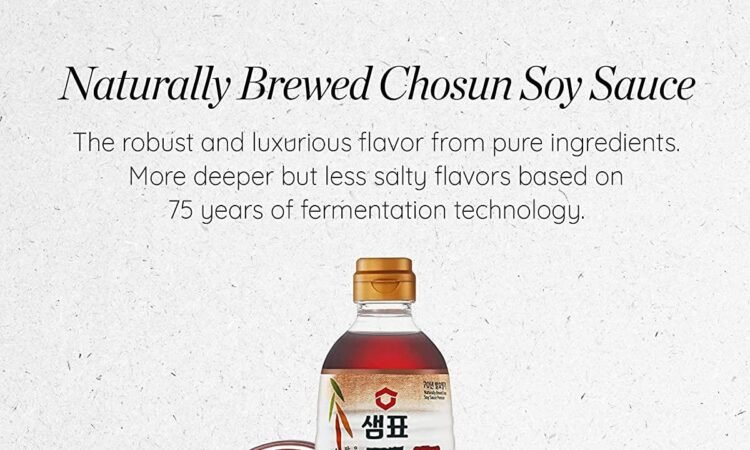
Chosun Soy Sauce Nutrition: A Breakdown
Chosun soy sauce is a staple in Korean cuisine, known for its distinct umami flavor. It contains essential nutrients, including amino acids, minimal fats, and proteins. However, its sodium content is a key consideration. A single tablespoon of Chosun soy sauce typically contains 900-1000 mg of sodium, nearly half the recommended daily intake. The fermentation process enhances its probiotic potential, contributing to gut health. Additionally, it provides trace minerals like potassium and magnesium, which support cellular function. Chosun soy sauce is also rich in glutamic acid, enhancing its savory taste. However, it lacks significant fiber, vitamins, and healthy fats, making it an accompaniment rather than a primary nutrient source.
Chosun Soy Sauce Fermentation Process and Antioxidants
The fermentation process of Chosun soy sauce involves the use of koji mold, yeast, and lactic acid bacteria, which enhance its nutritional profile. The lengthy aging process produces antioxidants like polyphenols and flavonoids, which help reduce oxidative stress. Fermentation also influences the formation of bioactive peptides that may support cardiovascular health. These bioactive compounds have been studied for their anti-inflammatory and antimicrobial properties, potentially aiding in immune support. The presence of isoflavones, plant-derived compounds, contributes to hormonal balance, especially in postmenopausal women.
Chosun Soy Sauce and Blood Pressure: A Concern?
Due to its high sodium content, excessive consumption of Chosun soy sauce can elevate blood pressure levels. High sodium intake is linked to hypertension, which increases the risk of heart disease and stroke. Individuals with blood pressure concerns should opt for low-sodium alternatives or consume it in moderation. The presence of peptides in fermented soy sauces may counteract some of the sodium’s adverse effects by helping relax blood vessels. However, individuals with kidney disease should be cautious, as excess sodium can impair kidney function.
Chosun Soy Sauce and Digestive Benefits
Fermented foods, including Chosun soy sauce, contain probiotic compounds that may promote a healthy gut microbiome. Probiotics aid in digestion, improve nutrient absorption, and support overall gut health. However, its MSG content in some varieties can trigger mild digestive discomfort in sensitive individuals. Chosun soy sauce also contains short-chain fatty acids, which nourish beneficial gut bacteria. Additionally, its umami-rich nature may stimulate digestive enzymes, aiding in more efficient food breakdown.
Chosun Soy Sauce vs Traditional Soy Sauce: Key Differences
Compared to traditional soy sauce, Chosun soy sauce undergoes a longer fermentation process, yielding a richer taste and higher antioxidant content. Traditional soy sauce varieties may contain additional preservatives or artificial additives, whereas Chosun soy sauce often follows a more natural brewing process. Moreover, Chosun soy sauce is typically less salty yet more complex in flavor, making it a preferred choice for gourmet cooking.
Is Chosun Soy Sauce Gluten-Free?
While some soy sauces contain wheat, Chosun soy sauce offers gluten-free varieties made from pure soybeans. For individuals with gluten sensitivity or celiac disease, checking ingredient labels is essential to avoid gluten-related complications. Even trace amounts of gluten can cause digestive distress in gluten-intolerant individuals. Opting for tamari-style Chosun soy sauce ensures a gluten-free experience.
Chosun Soy Sauce and Heart Health
The potential benefits of soy sauce for heart health stem from its antioxidants and amino acids. Certain studies suggest that fermented soy products may reduce LDL cholesterol levels and improve artery function. However, high sodium levels could counteract these benefits if consumed excessively. Some research suggests that soy-based isoflavones can improve vascular flexibility and reduce arterial stiffness, which are critical for heart health.
Chosun Soy Sauce and Cancer Risk: What Studies Say
Research on soy sauce and cancer risk is inconclusive. Some studies indicate that fermented soy products may contain beneficial compounds, while others caution against consuming excess amounts of 3-MCPD, a contaminant that forms during high-heat processing and has been linked to potential carcinogenic effects. Moderation is key, and choosing naturally fermented versions reduces exposure to harmful byproducts.
Chosun Soy Sauce and MSG: A Controversial Ingredient
Some commercial varieties of Chosun soy sauce may contain monosodium glutamate (MSG), a flavor enhancer linked to headaches and nausea in sensitive individuals. However, naturally brewed soy sauces tend to have lower MSG concentrations compared to artificially enhanced versions. The debate around MSG continues, with some studies debunking its negative effects while others suggest cautious consumption.
Chosun Soy Sauce and Diabetes: Is It Safe?
For individuals with diabetes, consuming soy sauce in moderation is key. While soy protein and amino acids may offer metabolic benefits, high sodium levels can contribute to increased insulin resistance and affect blood sugar regulation. Choosing low-sodium versions minimizes potential risks. Some research suggests that soy peptides may enhance insulin sensitivity, but more studies are needed to confirm their impact.
Chosun Soy Sauce and Weight Loss
Chosun soy sauce is low in calories, making it a flavorful addition to a weight-loss diet. However, its high sodium content can cause water retention, leading to temporary weight fluctuations. Opting for low-sodium versions may be a better choice for those focusing on weight management. Additionally, its umami profile can enhance food satisfaction, potentially reducing overeating tendencies.
Chosun Soy Sauce Allergens: What to Watch Out For
Soy sauce contains common allergens, including soy and wheat. Those with soy allergies should avoid it entirely, while individuals with gluten intolerance should choose certified gluten-free options. Cross-contamination during production is also a consideration for individuals with severe allergies.
Chosun Soy Sauce Probiotics and Gut Health
Fermentation enhances the probiotic content of Chosun soy sauce, which can support gut microbiome balance. Beneficial bacteria from fermentation may aid in digestion and immune function. Regular consumption of probiotic-rich foods is associated with improved gut integrity and reduced inflammation.
Chosun Soy Sauce and Cholesterol Levels
Some research suggests that fermented soy foods may help lower LDL cholesterol, but the high sodium content in soy sauce might negate these benefits. Consuming it in moderation remains essential for individuals managing cholesterol levels.
Chosun Soy Sauce Amino Acids: Nutritional Benefits
Chosun soy sauce contains essential amino acids, which contribute to muscle growth, metabolism, and immune function. Its umami-rich profile enhances dishes without adding excess calories. Amino acids also play a role in neurotransmitter function, supporting cognitive health.
